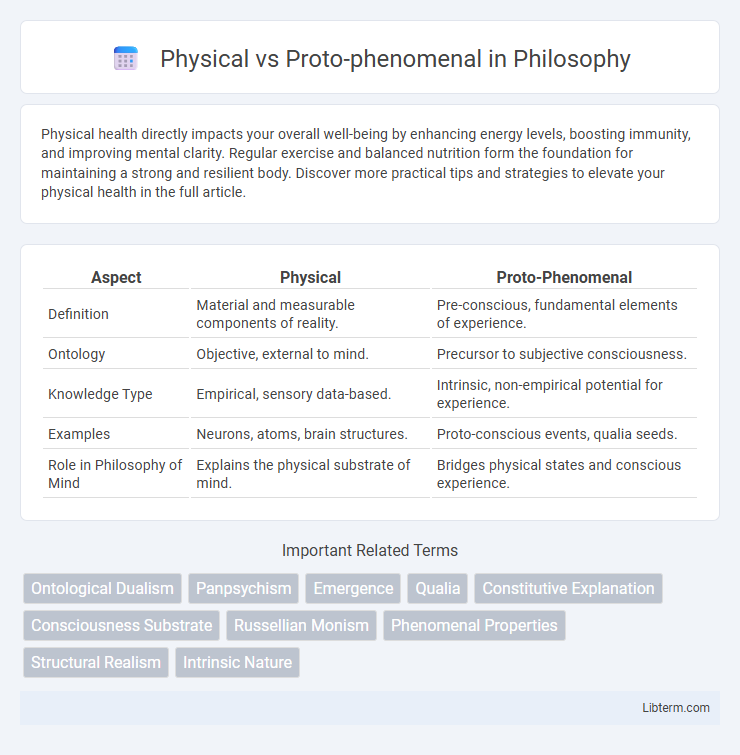Physical health directly impacts your overall well-being by enhancing energy levels, boosting immunity, and improving mental clarity. Regular exercise and balanced nutrition form the foundation for maintaining a strong and resilient body. Discover more practical tips and strategies to elevate your physical health in the full article.
Table of Comparison
| Aspect | Physical | Proto-Phenomenal |
|---|---|---|
| Definition | Material and measurable components of reality. | Pre-conscious, fundamental elements of experience. |
| Ontology | Objective, external to mind. | Precursor to subjective consciousness. |
| Knowledge Type | Empirical, sensory data-based. | Intrinsic, non-empirical potential for experience. |
| Examples | Neurons, atoms, brain structures. | Proto-conscious events, qualia seeds. |
| Role in Philosophy of Mind | Explains the physical substrate of mind. | Bridges physical states and conscious experience. |
Introduction to Physical and Proto-phenomenal Theories
Physical theories emphasize objective, measurable phenomena governed by natural laws and observable properties such as mass, energy, and spatial-temporal relations. Proto-phenomenal theories explore pre-conscious, foundational qualities underlying sensory experience, aiming to bridge physical processes with subjective phenomenology. These approaches differ fundamentally in addressing the nature of reality, with physical theories rooted in empirical science and proto-phenomenal theories centered on explaining the emergence of conscious experience from basic experiential building blocks.
Defining Physicalism in Philosophy of Mind
Physicalism in the philosophy of mind asserts that everything about the mind can be explained in terms of physical processes and properties, rejecting any non-physical substances or properties. It contrasts with proto-phenomenal theories, which propose that mental phenomena arise from more fundamental non-physical proto-phenomenal qualities or proto-experiences. Defining physicalism involves addressing how mental states relate to brain states, emphasizing that all mental events are ultimately physical events expressible through neurological or physical descriptions.
Understanding Proto-phenomenal Concepts
Proto-phenomenal concepts refer to the basic, pre-conscious properties that give rise to subjective experience, existing as foundational elements in theories of consciousness. Unlike physical properties, which are measurable and objectively observable, proto-phenomenal properties are proposed to be intrinsic qualities that bridge the gap between matter and experience. Understanding proto-phenomenal concepts involves exploring how these fundamental, non-reducible properties contribute to the emergence of phenomenal consciousness in cognitive science and philosophy of mind.
Historical Development of Each Perspective
The physical perspective of consciousness has its roots in classical physics and neuroscience, emphasizing observable brain processes and neural correlates discovered throughout the 19th and 20th centuries. Proto-phenomenal theory, emerging from philosophical inquiries during the late 20th century, posits that consciousness arises from fundamental, primitive experiential properties embedded in physical entities. The historical development of these perspectives reflects a shift from purely empirical brain studies to integrating phenomenological and philosophical frameworks aiming to bridge the explanatory gap.
Key Differences Between Physical and Proto-phenomenal Views
Physical views emphasize that consciousness arises from physical processes in the brain, relying on neural activity and biochemical interactions as the basis for experience. Proto-phenomenal perspectives argue that fundamental properties of consciousness exist at a more basic, pre-phenomenal level, suggesting that proto-phenomenal qualities underpin the emergence of subjective experience. The key difference lies in physicalism's reduction of consciousness to physical states versus proto-phenomenal theories positing innate experiential potentials independent of classical physical descriptions.
The Role of Consciousness in Both Theories
Physical theories posit that consciousness emerges from neural processes and brain activity, emphasizing physical matter as the foundation of experience. Proto-phenomenal theories argue that consciousness consists of fundamental, pre-phenomenal properties intrinsic to the fabric of reality, suggesting a non-physical basis for awareness. The role of consciousness in physicalism is dependent on matter's organization, while proto-phenomenalism treats consciousness as a basic constituent, challenging the idea that consciousness is solely a byproduct of physical interactions.
Scientific Implications and Empirical Challenges
Physical phenomena involve measurable, observable properties governed by established scientific laws, enabling empirical testing and reproducibility; proto-phenomenal aspects relate to the preliminary or foundational elements of conscious experience that resist direct measurement or quantification. Scientific implications of studying proto-phenomenal states challenge reductionist approaches by suggesting that consciousness may not be fully explained through physical processes alone, prompting interdisciplinary research integrating neuroscience, philosophy, and quantum theory. Empirical challenges include the difficulty in designing experiments that isolate subjective qualitative experiences and the limitations of current technology in capturing the nuances of proto-phenomenal states, which complicates objective validation within the scientific method.
Philosophical Debates and Thought Experiments
Philosophical debates on Physical vs Proto-phenomenal properties center around the nature of consciousness and its relation to the physical world, highlighting tensions between materialist and dualist perspectives. Thought experiments such as Frank Jackson's "Mary's Room" and David Chalmers' "Zombie Argument" challenge the sufficiency of physical explanations for phenomenal experience, emphasizing the explanatory gap. These discussions probe whether proto-phenomenal properties serve as fundamental building blocks bridging physical processes and subjective awareness.
Impact on Artificial Intelligence and Cognitive Science
Physical phenomena refer to objective, measurable events governed by natural laws, while proto-phenomenal aspects relate to the foundational qualities of subjective experience that precede full consciousness. Understanding proto-phenomenal properties is crucial for advancing Artificial Intelligence, as it may enable the creation of machines with genuine experiential awareness rather than purely algorithmic responses. In cognitive science, integrating physical data with proto-phenomenal insights drives progress in modeling human consciousness, enhancing AI systems that better mimic nuanced cognitive processes and subjective perception.
Future Directions and Open Questions
Future directions in the study of Physical vs Proto-phenomenal realms include exploring the integration of quantum mechanics with phenomenological experiences to clarify the nature of consciousness. Open questions remain regarding the precise mechanisms by which proto-phenomenal properties give rise to physical phenomena and how this relationship can be empirically tested. Advancements in neurotechnology and computational modeling offer promising avenues to bridge gaps between physical states and proto-phenomenal subjective experiences.
Physical Infographic

 libterm.com
libterm.com